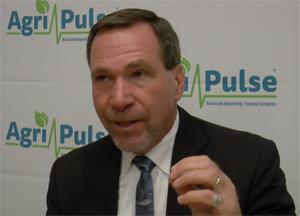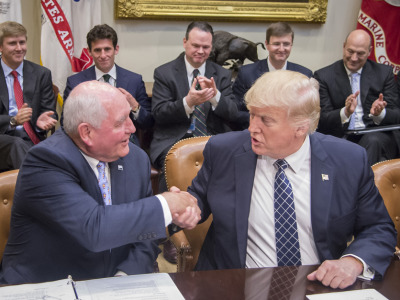After witnessing a presidential campaign that was big on bombast and small on concrete policy proposals, many – including ag organizations – wondered what to expect from the Trump administration’s first year in office. As that year comes to a close, the nation’s farm groups appear to have a love/hate relationship with President Donald Trump’s actions.
As Blake Hurst, president of Missouri Farm Bureau, put it, Trump’s administration has “accomplished more on regulatory reform than I think anybody would have thought possible and been even worse on trade than we feared.” That opinion is representative of the feelings of a number of food and agriculture stakeholders; they’re grateful for actions taken to repeal the Waters of the U.S. rule and a set of livestock marketing rules, but are disappointed at the loss of the Trans-Pacific Partnership and downright petrified at the prospect of losing the North American Free Trade Agreement.
Tom Sleight, president and CEO of the U.S. Grains Council, says Mexico, the top market for U.S. corn and the U.S.’ third-largest agricultural trading partner, is changing its opinion on U.S. ag products.
“Our best customer now sees the U.S. as not a reliable supplier of grain,” Sleight told Agri-Pulse. “That’s what our customers are saying, that they don’t view the U.S. as a reliable supplier anymore. That’s extraordinary.”
The U.S. has made things difficult during the NAFTA renegotiations by pushing a very ambitious agenda. Originally, officials were hoping to conclude talks by the end of 2017. Now, another round of discussions has been scheduled for January 2018.
But before the administration sat down to talk through changes to NAFTA, there was concern the trade pact might meet the same fate as the Trans-Pacific Partnership, the deal with Pacific Rim countries negotiated during the Obama administration. Trump pulled the U.S. from the agreement seemingly before he had unpacked at the White House, and now the remaining 11 countries have agreed in principle to a reworked deal.
Agricultural exporters now have to cope with the loss of increased access to markets like Japan, especially as those countries continue to work on deals elsewhere.
“What we’ve seen, subsequent to the U.S. moving away from TPP, is the European Union has swooped in,” Nick Giordano with the National Pork Producers Council, said in an interview with Agri-Pulse. He noted that the European Union, "a big pork-exporting" bloc of 28 countries, "got a TPP-type deal with Japan. That’s a big concern to us, because that EU-Japan deal will be implemented, if not next year, in 2019. We know we’re going to lose sales.”

Nick Giordano, NPPC
Even the National Farmers Union, which was one of the few farm organizations strongly opposed to TPP and isn’t exactly known for singing the praises of NAFTA, doesn’t support pulling out of an agreement that has significantly expanded U.S. ag exports.
“Our members think it’s positive that they are looking at trade agreements pretty seriously,” NFU lobbyist Rob Larew said. “At the same time, we don’t need to be just pulling out of things like NAFTA, which is going to have a dramatic negative effect on farmers and ranchers out there.”
For all the worry on trade, those same groups can hardly contain their excitement at what Trump and his cohorts have done to a laundry list of Obama administration regulations. After spending the previous eight years decrying regulatory overreach, farm groups are now breathing a sigh of relief.
For starters – and perhaps most significantly – Trump has redirected the WOTUS rule back to the EPA for a rewrite. That move was cheered far and wide by ag groups who feared the rule would amount to EPA exerting its control over a water body as small as a puddle. Zippy Duvall, president of the American Farm Bureau Federation, even posted a photo with Trump on Twitter taken at the White House thanking him for “fulfilling this promise to farmers & ranchers.”
During Trump’s tenure, the Department of Agriculture has also notably paused a pair of livestock regulations finalized in the closing months of the Obama administration. In November, USDA delayed implementation of animal welfare standards in organic agriculture while also questioning the legal basis used to issue the rules in the first place. While that decision could very well lead to the standards being repealed before the May 2018 deadline comes around, USDA has already chosen to repeal the so-called “GIPSA rules,” which would have changed proof-of-harm requirements and made it easier for contract growers to file suit over uncompetitive practices.
That decision was cheered by major livestock groups but reviled by small farmer advocates. Sen. Chuck Grassley, R-Iowa, said he had “violent opposition” to the decision and accused USDA of “pandering to big corporations.” Groups like the Organization for Competitive Markets also directed ire at Ag Secretary Sonny Perdue for pulling the trigger on repeal, with OCM going as far as urging Trump to reinstate the rules via executive order. More than a month past the initial repeal, that doesn’t look likely.
"I know there’s a lot of people that say ‘Oh, you know, it would enhance competition,’" Giordano said. "Quite to the contrary,” he added, "it would have driven consolidation in the industry.”
In addition, there’s also the continuing saga over governance of the Renewable Fuel Standard, ongoing concerns about a farm labor shortage, optimism over potential tax reform, reviewing and resizing recent monument designations in the Western U.S., and an opioid crisis crippling parts of rural America. Just with agriculture alone, this administration has its hands full. That’s a problem, given the staffing shortage in the department, which had only one political appointee (Perdue) until October.

Ag groups have been pleased with Trump's choice for agriculture secretary, former Georgia governor Sonny Perdue
“Probably the biggest concern right now is the fact that we don’t have all the undersecretaries in place and the agency heads,” National Cattlemen’s Beef Association lobbyist Colin Woodall said. “There’s a lot of small things, for example, that need to be done that the secretary is not going to take the time to do. He’s overwhelmed as it is, so we need those undersecretaries and agency heads to really just make government work.”
As much frustration as there has been with other Trump appointees in other arenas, agriculture groups seem largely satisfied with the pending leadership roster at USDA. Larew said NFU sees “a lot of positive things coming from Secretary Perdue,” and Giordano said he thinks “the team at USDA is shaping up to be – in my recollection – the strongest USDA team we’ve ever had.” Several ag groups have also been vocally supportive of EPA Administrator Scott Pruitt’s “back to basics” approach, while environmental groups haven’t shared that enthusiasm.
If Trump’s four-year term were a movie series, the first edition appears to have ag groups interested enough to plan on buying tickets for the sequel. In farm policy circles, much of that attention will likely be taken up by the farm bill, but look for ag groups to also keep a keen eye on NAFTA talks, ongoing regulatory reform efforts, and the whole litany of policy battles important to the nation’s farmers and ranchers.
#30
For more news, go to www.Agri-Pulse.com


